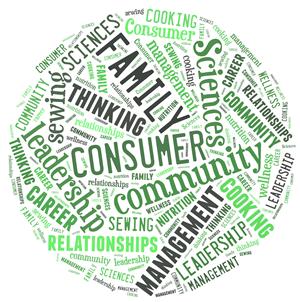-
Family and Consumer Sciences
 Students in 7th grade receive FACS instruction every other day.
Students in 7th grade receive FACS instruction every other day.Middle level Family and Consumer Sciences education is delivered through the state-mandated course, Home and Career Skills.
Home and Career Skills is a course designed to help middle level students live in a society of constant change and to improve their quality of life by preparing them to meet their present and future responsibilities as family member and community members, consumers, home managers, and wage earners. The goal is to educate early adolescents to think constructively, make sound decisions, solve problems, and manage resources.
Home and Career Skills is the vehicle through which the New York State Intermediate Level Learning Standards for Family and Consumer Sciences are delivered. It also focuses on the New York State Intermediate Level Learning Standards in Career Development and Occupational Studies. The Home and Career Skills course affords students multiple opportunities to read, write, and compute in the context of real-world situations that are relevant to early adolescents.
Home and Career Skills is organized around four process skills: communication, leadership, management, and thinking. These process skills are taught through ten content topics: community connections, career development, clothing management, consumer resource management, family/parenting, financial management, human development, interpersonal relationships, nutrition and wellness, personal environment management. Home and Career Skills process skills and content topics align with the National Learning Standards for Family and Consumer Sciences. In order for the full curriculum to be delivered learning experiences must be designed to dovetail process skills with content topics.
The Home and Career Skills course is to be taught using a hands-on experiential approach. Learning occurs in the context of real-life situations and repeated practice is encouraged. It is recommended that the course be delivered in a laboratory setting and involve a minimum of 75% hands-on instruction. The use of real-life relevant tasks, laboratories, simulations, and community involvement is an integral part of the course as is the use of research, class discussions, and group activities. Students are expected to be actively involved in learning in a participatory, supportive environment and to have the opportunity to practice and to develop the process skills as related to the content topics.
Select a School...
Select a School
- PreKindergarten & Early Childhood
- George Mather Forbes School No. 4
- John Williams School No. 5
- OACES Office of Adult & Career Education Services
- Virgil I. Grissom School No. 7
- Roberto Clemente School No. 8
- Dr. Martin Luther King Jr. School No. 9
- Anna Murray Douglass Academy School No. 12
- RECEC NE
- The Children's School of Rochester No. 15
- Dr. David & Ruth Anderson Academy No. 16
- Enrico Fermi School No. 17
- Dr. Charles T. Lunsford School No. 19
- Abraham Lincoln School No. 22
- Francis Parker School No. 23
- Nathaniel Hawthorne School No. 25
- Henry Hudson School No. 28
- Dr. Iris J. Banister School No. 33
- Ida B. Wells-Barnett Elementary School
- Pinnacle School No. 35
- Abelard Reynolds School No. 42
- Mary McLeod Bethune School No. 45
- Austin Steward Elementary School No. 46
- Helen Barrett Montgomery School No. 50
- Frank Fowler Dow School No. 52
- Montessori Academy School No. 53
- The Flower City School No. 54
- World of Inquiry School No. 58
- All City High
- Early College International High School
- East Upper & Lower Schools
- Edison Career and Technology High School
- Padilla High School at the Franklin Campus
- James Monroe High School
- Joseph C. Wilson Magnet High School
- Northwest Middle School at Douglass Campus
- Rochester International Academy
- School of the Arts
- School Without Walls Commencement Academy
- Home / Hospital Instruction
- Youth and Justice Programs
- Department of Bilingual Education & World Languages
- Special Education
- IM&T
- School Library System
- Student Support Services
- Virtual Academy of Rochester
- Summer Learning
- Dr. Freddie Thomas Middle School
- Andrew Langston Middle School
- Loretta Johnson Middle School
- Thurgood Marshall Middle School
- Florence S. Brown PreK Center at School No. 33

